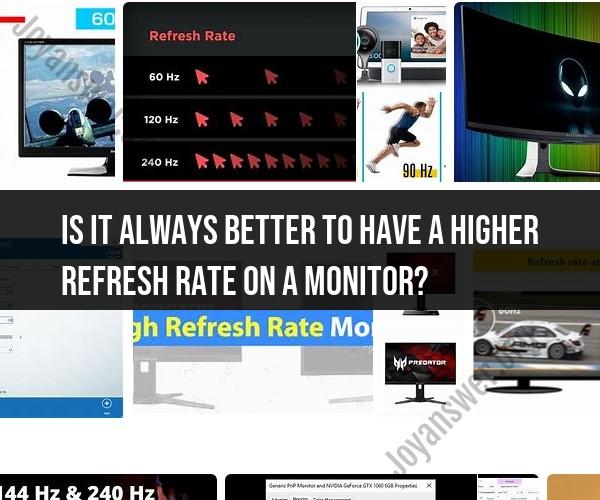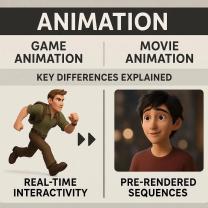Is it always better to have a higher refresh rate on a monitor?
No, it is not always better to have a higher refresh rate on a monitor, as the impact of refresh rate on display quality depends on various factors, including the intended use of the monitor, the content being displayed, and the capabilities of the computer hardware driving the monitor. Here are some key considerations:
Usage Scenario:
Gaming: For gamers, a higher refresh rate, such as 120Hz, 144Hz, or even 240Hz, can provide a smoother and more responsive gaming experience. High refresh rates reduce motion blur and can make fast-paced games feel more fluid.
Productivity and General Use: For everyday tasks, office work, web browsing, or watching videos, a standard 60Hz refresh rate is usually sufficient and may not provide noticeable benefits beyond that.
Content Type:
Video Content: Most video content, including movies and TV shows, is typically filmed and displayed at 24 or 30 frames per second (fps). In such cases, a higher refresh rate monitor won't make a significant difference in visual quality.
Gaming Content: Some video games can benefit from higher refresh rates, but it also depends on the frame rate at which the game is running. If a game is capped at 60fps, for example, a 120Hz monitor won't display more than 60 unique frames per second.
Hardware Capabilities:
- To fully utilize a high refresh rate monitor, you need a computer system that can consistently produce frames at a rate close to or exceeding the monitor's refresh rate. If your hardware can't keep up, you may not see the full benefits of the higher refresh rate.
Cost and Availability:
- Monitors with higher refresh rates tend to be more expensive than standard 60Hz monitors. If you're on a budget and don't require a high refresh rate for your specific use case, you may opt for a more affordable 60Hz monitor.
Eye Sensitivity:
- Some individuals may not notice a significant difference in visual quality between 60Hz and higher refresh rates. Eye sensitivity varies from person to person, and not everyone perceives smoother motion at higher refresh rates.
Adaptive Sync Technologies:
- Adaptive sync technologies like NVIDIA G-Sync and AMD FreeSync can help reduce screen tearing and stuttering when the frame rate of the graphics card doesn't perfectly match the monitor's refresh rate. These technologies can enhance the experience on monitors with variable refresh rates.
In summary, whether it's better to have a higher refresh rate on a monitor depends on your specific needs and preferences. For gaming and certain specialized applications, a higher refresh rate can provide a noticeable improvement in visual quality. However, for general use and video playback, a standard 60Hz monitor is often sufficient. Additionally, consider the capabilities of your computer hardware and your budget when selecting a monitor with a specific refresh rate.













